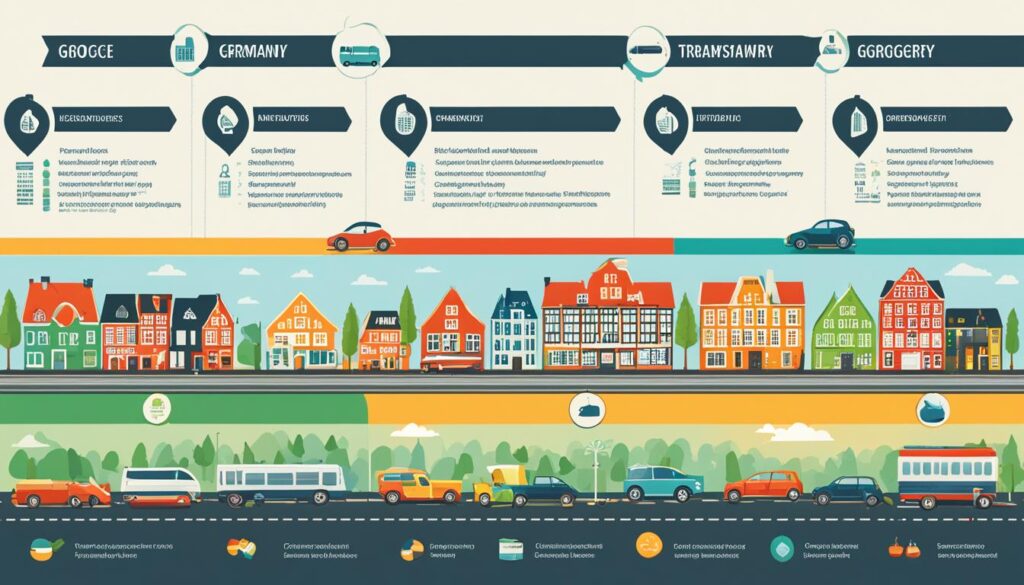Relocating to Germany can be a rewarding adventure filled with opportunities. This comprehensive guide aims to equip you with the essential information you need as you embark on this exciting journey. You will discover key considerations such as how to move to Germany, understanding visa requirements, finding job opportunities, securing housing, and navigating healthcare options.
With a focus on making your transition to expat life in Germany as smooth as possible, our guide outlines practical tips and recommendations. For instance, EU citizens do not require a visa to move to Germany1, while non-EU citizens will need to navigate through different types of residence permits based on their circumstances. This guide will help you understand not only the basic steps of moving but also the more nuanced details that can significantly impact your experience.
Whether you’re looking to start a new career, settle down, or simply explore all that Germany has to offer, our guide will provide you with the insights you need to thrive in your new home. You can start your journey by reading more about how to move to Germany. Don’t miss out on information that will help ease your journey, and step into your new German life with confidence!
Key Takeaways
- Proper planning is essential for a smooth relocation process.
- Visas play a crucial role for non-EU citizens and vary by purpose.
- Secure health insurance and housing before moving to ensure stability.
- Understanding the German job market will greatly aid your employment search.
- Registration and legal requirements must be prioritized upon arrival.
Unlock Investment Opportunities Abroad!
Understanding the Basics of Relocating to Germany
Relocating to Germany can be both an exciting and daunting endeavor. With a well-structured plan, you can navigate the vast opportunities and challenges that await. Adequate preparation is crucial in ensuring a seamless transition, as poor planning may lead to unforeseen complications, including financial strain or extended delays.
The Importance of Planning
Planning to move to Germany involves understanding various factors, such as job opportunities, accommodation, and the local culture. The journey begins with recognizing the bureaucratic requirements. Being organized can significantly ease the hurdles presented by the bureaucracy in Germany. Citizens from countries like the United States can enter Germany without a visa for short visits, but it is essential to apply for a residence permit for longer stays, which typically takes about 2-4 weeks to process2.
Navigating Bureaucracy and Legal Requirements
Properly navigating the legal landscape is a fundamental step when relocating to Germany. Prospective residents should familiarize themselves with the processes for obtaining vital documents such as work visas and residency permits. Key legal requirements include registering with local authorities after arrival and ensuring compliance with immigration laws. Employing a professional to assist with these procedures can alleviate some of the burdens posed by the complex bureaucracy in Germany, which can vary greatly depending on individual circumstances and nationalities. With approximately 9 million Americans living abroad, many have highlighted the importance of thorough research during their relocation journey3.
| Key Requirement | Description |
|---|---|
| Visa Application | Required for work opportunities, particularly for non-EU citizens. |
| Residence Permit | Mandatory for non-EU citizens planning an extended stay. |
| Local Registration | Must register with local authorities upon arrival in Germany. |
| Language Proficiency | Understanding German can significantly ease the integration process. |
Explore more about planning to move to and how understanding these basics contributes to a successful relocation342.
How to Move to Germany: Your Step-by-Step Process

Successfully relocating to Germany involves thorough planning, with financial considerations at the forefront. Consolidating your understanding of the cost of living in Germany is vital in preparing your budget for moving. It’s essential to account for hidden costs, such as initial setup fees and ongoing expenses, which can often catch newcomers by surprise.
Preparing Your Budget
Setting up a realistic budget can make all the difference in your moving experience. The average start-up costs associated with moving to Germany typically range from €3,000 to €5,000, which includes expenses like accommodation and initial living costs5. Renting in cities like Berlin may cost around €790 for a room, while Hamburg and Frankfurt are pricier, with average rents reaching €1,350 and €1,400, respectively6. Monthly living expenses must also be factored in, especially if you’re a student, as it’s recommended to maintain a blocked account with about €861 available each month5. Furthermore, estimating costs for health insurance, which can range between €100 and €200 monthly, is crucial5.
Unlock Investment Opportunities Abroad!
Key Steps Before Moving
To ensure a smooth transition, several essential steps must be followed before relocating to Germany. First, gather and verify all necessary documents, including those required for visas and residency permits. Booking your flights well in advance will save money and provide peace of mind. Securing health insurance is not just a smart choice but a legal requirement, making this a priority for students and workers alike6. Also, don’t forget about your pets; ensure they have proper documentation and microchips for your move to Germany.
Understanding these steps before relocating to Germany provides a clear pathway to your new life. It’s key to note that non-EU citizens must exchange their driving licenses within six months if they plan to drive in Germany6. Proper financial planning lays the groundwork for a successful relocation process.
| Category | Average Cost |
|---|---|
| Start-up Costs | €3,000 – €5,000 |
| Average Rent in Berlin | €790 |
| Average Rent in Hamburg | €1,350 |
| Average Rent in Frankfurt | €1,400 |
| Monthly Living Expenses (Blocked Account) | €861 |
| Health Insurance | €100 – €200 |
By thoroughly preparing and understanding the financial landscape in Germany, you’ll set yourself up for a successful move.
Visa Requirements for Moving to Germany

Understanding the visa requirements Germany is crucial for a smooth relocation experience. There are several types of visas available for those planning to move to Germany, catering to different needs such as work, study, and family reunification. Below we detail the main types of visas and the essential documentation required for application.
Types of Visas Available
The most common type of visa for moving to Germany is the working visa, which allows foreign nationals to live and work in the country. This visa, along with other long-stay visas, typically involves a fee, such as 75 EUR (88 USD) for employment and work permits. Visit this link for further insights into the visa categories.
- Employment Visa: Designed for individuals who have secured a job offer in Germany.
- EU Blue Card: For highly skilled workers, particularly in shortage occupations.
- Student Visa: For those looking to pursue higher education in Germany.
- Family Reunification Visa: Enables family members to join those already residing in Germany.
Application Process and Timelines
The application process for a German visa can seem daunting but is manageable with the right preparation. It is advisable to apply well in advance, ideally up to three months before your intended arrival, to avoid unnecessary delays. The Federal Employment Agency plays a vital role in verifying if the occupation qualifies for a residence permit, especially for skilled workers7.
The timeline for processing your application may vary. Generally, short-stay visas can be processed within a few weeks while long-stay visas may take longer due to additional paperwork and verification, particularly for work permits and family reunification. For those depending on skilled worker visas, proof of a recognized degree or training is essential for your residence title8.
Finding a Suitable Place to Live in Germany
When relocating to Germany, the search for housing is a pivotal element of the process. Understanding the differences between short-term accommodation and long-term housing is essential for a smooth transition. Short-term accommodation options, such as serviced apartments and temporary rentals, can serve as a transitional phase while you explore your new surroundings. However, it’s crucial to secure long-term housing that permits official registration (Anmeldung), a necessity for living in Germany. Cities like Berlin, known for its vibrant lifestyle and startup scene, offer a variety of options, albeit with fluctuating rental prices based on neighborhood preferences9.
Short-term vs. Long-term Accommodation
Weighing the benefits of short-term accommodation vs. long-term solutions can set you on the right path. While short-term stays provide flexibility, long-term housing typically translates to a sense of stability and community. For those interested in the best cities to live in Germany, cities like Munich provide lower crime rates and a higher cost of living, whereas Berlin is more budget-friendly but comes with its challenges, including higher crime rates10. Additionally, consider the differences in average rental prices: Berlin averages €1,500 for an apartment, while Munich can reach €1,7709.
Best Online Resources for Apartment Hunting
Finding accommodation in Germany is made easier with various online platforms designed to assist in the search. Websites like Uniplaces are ideal for students and young professionals looking to settle into their new homes. Moreover, utilizing resources that provide extensive listings for different neighborhoods increases the likelihood of finding your ideal fit. With around 56% of residents speaking English, navigating these platforms and connecting with landlords should be relatively straightforward10. Explore more on the best cities to live in Germany and optimize your apartment hunting journey here.
Unlock Investment Opportunities Abroad!
FAQ
What are the initial steps to take when planning my move to Germany?
What visa options are available for moving to Germany?
How can I find housing in Germany?
What is the cost of living in Germany?
Do I need health insurance to move to Germany?
How long does the visa application process take?
What should I include in my budget for relocating to Germany?
Source Links
- https://n26.com/en-eu/moving-to-germany
- https://www.deel.com/blog/moving-to-germany-for-expats/
- https://www.allied.com/international-moving-company/areas-served/moving-to-germany
- https://suddath.com/moving-company/moving-tips/the-complete-guide-to-moving-to-germany-from-the-usa/
- https://wanderonwards.co/how-move-to-germany-from-us/
- https://housinganywhere.com/Germany/moving-to-germany-checklist
- https://www.make-it-in-germany.com/en/visa-residence/skilled-immigration-act
- https://www.internations.org/germany-expats/guide/moving-to
- https://housinganywhere.com/Germany/best-cities-in-germany-to-live
- https://www.remofirst.com/post/best-place-to-live-in-germany-for-english-speakers

Comments